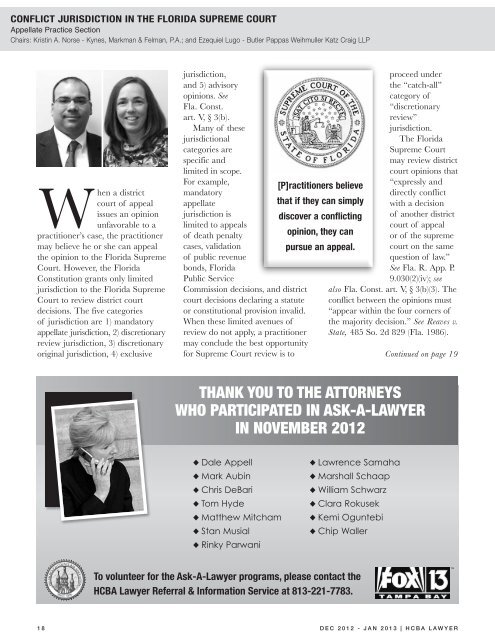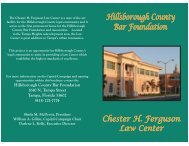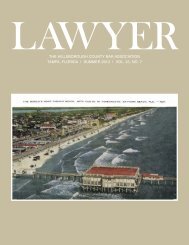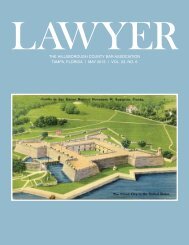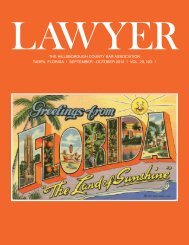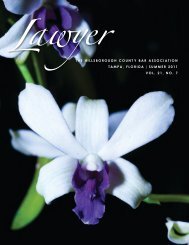december 2012 - Hillsborough County Bar Association
december 2012 - Hillsborough County Bar Association
december 2012 - Hillsborough County Bar Association
You also want an ePaper? Increase the reach of your titles
YUMPU automatically turns print PDFs into web optimized ePapers that Google loves.
CONFLICT JURISDICTION IN THE FLORIDA SUPREME COURT<br />
Appellate Practice Section<br />
Chairs: Kristin A. Norse - Kynes, Markman & Felman, P.A.; and Ezequiel Lugo - Butler Pappas Weihmuller Katz Craig LLP<br />
When a district<br />
court of appeal<br />
issues an opinion<br />
unfavorable to a<br />
practitioner’s case, the practitioner<br />
may believe he or she can appeal<br />
the opinion to the Florida Supreme<br />
Court. However, the Florida<br />
Constitution grants only limited<br />
jurisdiction to the Florida Supreme<br />
Court to review district court<br />
decisions. The five categories<br />
of jurisdiction are 1) mandatory<br />
appellate jurisdiction, 2) discretionary<br />
review jurisdiction, 3) discretionary<br />
original jurisdiction, 4) exclusive<br />
jurisdiction,<br />
and 5) advisory<br />
opinions. See<br />
Fla. Const.<br />
art. V, § 3(b).<br />
Many of these<br />
jurisdictional<br />
categories are<br />
specific and<br />
limited in scope.<br />
For example,<br />
mandatory<br />
appellate<br />
jurisdiction is<br />
limited to appeals<br />
of death penalty<br />
cases, validation<br />
of public revenue<br />
bonds, Florida<br />
Public Service<br />
Commission decisions, and district<br />
court decisions declaring a statute<br />
or constitutional provision invalid.<br />
When these limited avenues of<br />
review do not apply, a practitioner<br />
may conclude the best opportunity<br />
for Supreme Court review is to<br />
[P]ractitioners believe<br />
that if they can simply<br />
discover a conflicting<br />
opinion, they can<br />
pursue an appeal.<br />
proceed under<br />
the “catch-all”<br />
category of<br />
“discretionary<br />
review”<br />
jurisdiction.<br />
The Florida<br />
Supreme Court<br />
may review district<br />
court opinions that<br />
“expressly and<br />
directly conflict<br />
with a decision<br />
of another district<br />
court of appeal<br />
or of the supreme<br />
court on the same<br />
question of law.”<br />
See Fla. R. App. P.<br />
9.030(2)(iv); see<br />
also Fla. Const. art. V, § 3(b)(3). The<br />
conflict between the opinions must<br />
“appear within the four corners of<br />
the majority decision.” See Reaves v.<br />
State, 485 So. 2d 829 (Fla. 1986).<br />
Continued on page 19<br />
THANK YOU TO THE ATTORNEYS<br />
WHO PARTICIPATED IN ASK-A-LAWYER<br />
IN NOVEMBER <strong>2012</strong><br />
u Dale Appell<br />
u Mark Aubin<br />
u Chris De<strong>Bar</strong>i<br />
u Tom Hyde<br />
u Matthew Mitcham<br />
u Stan Musial<br />
u Rinky Parwani<br />
u Lawrence Samaha<br />
u Marshall Schaap<br />
u William Schwarz<br />
u Clara Rokusek<br />
u Kemi Oguntebi<br />
u Chip Waller<br />
To volunteer for the Ask-A-Lawyer programs, please contact the<br />
HCBA Lawyer Referral & Information Service at 813-221-7783.<br />
TM<br />
18 DEC <strong>2012</strong> - JAN 2013 | HCBA LAWYER


